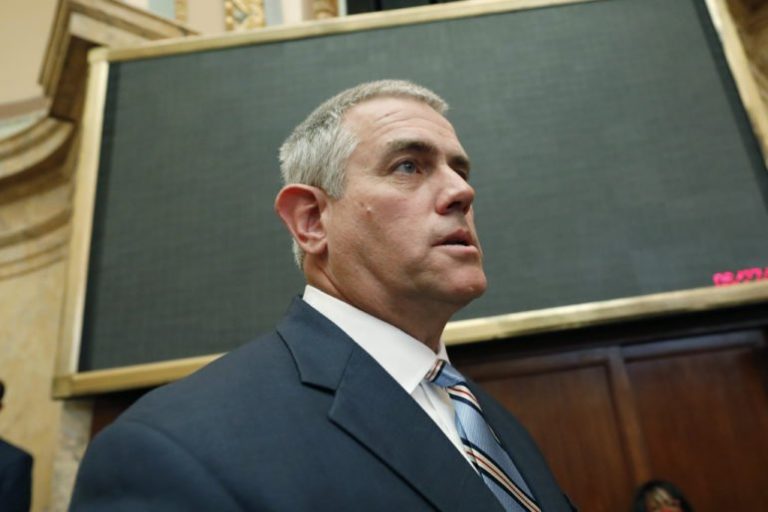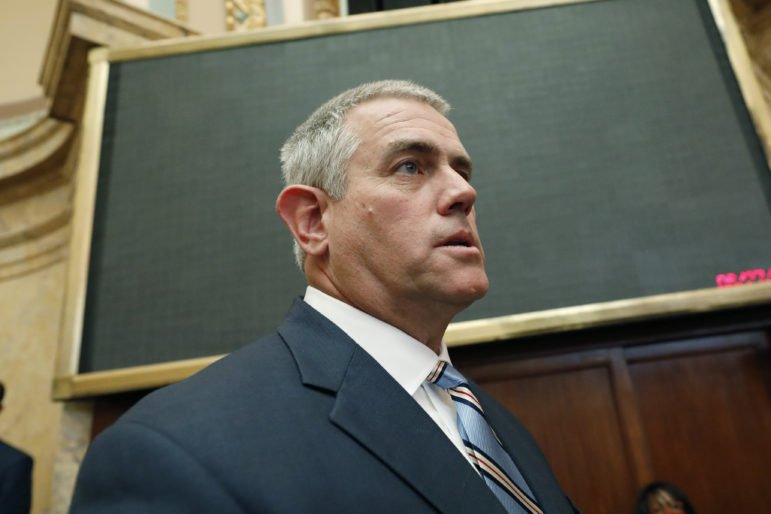

Speaker Philip Gunn, R-Clinton, speaks to reporters after House lawmakers passed the two-thirds threshold needed to suspend its rules and introduce a bill to change the Mississippi state flag. (AP Photo/Rogelio V. Solis)
Yard signs sprang up across the state the summer of 2015 proclaiming: “Keep the flag. Change the speaker.”
For many Mississippians that summer, no politician was a bigger foe than House Speaker Philip Gunn, R-Clinton, who had publicly said he supported changing the official state flag, the last in the nation displaying the controversial Confederate battle emblem.
Five years later, Gunn is still the speaker — in the first year of his third term as the House’s presiding officer — and the flag has been removed after lawmakers overwhelmingly passed the historic legislation last weekend.
“He was out there by himself (in 2015),” said Rep. Hank Zuber, R-Ocean Springs. “There was a sense it would take a very long period of time to change it, and through his leadership, you see where we are now.”
A number of factors led to the Legislature’s vote to change the flag last weekend: Organizer-led, grassroots energy for racial justice spurred by the police killing of George Floyd, an African American in Minneapolis; the public advocacy of key business leaders, sports figures and religious groups; the evolution on the issue of Lt. Gov. Delbert Hosemann, the presiding officer of the Senate, who had previously said the flag should change only by a vote of the people, not lawmakers.
“It was just time,” Hosemann said. “You know people started several weeks ago talking about this and the momentum…built until we had 71 percent of the Senate vote for this. It’s a tremendous vote when you looked at that — people from all across Mississippi. It was not just a Democrat measure… it was bipartisan. It was just time.”
But it was Gunn, who for years spoke and acted against the wishes of many Mississippians and even most of his own Republican caucus, who led the charge in changing the flag.
Over the years, few other Mississippi Republicans voiced support for changing the flag. The most notable Republican politicians to announce support for changing the flag since Gunn did were U.S Sens. Thad Cochran and Roger Wicker, but as federal officials all they could do was offer their opinions. They had no direct impact on changing state law.
But as the leader of the state House, Gunn did.
“I was more concerned about doing what was right,” said Gunn when asked if he feared political consequences for his stance in 2015. “It was not driven by any political agenda.”
And it was clear from early on that Gunn, a Baptist deacon, was influenced by his understanding of his faith.
“I believe what we did today honored God,” he said after the vote last weekend, citing Bible verses demanding people love and not offend their neighbor.
Gunn announced his support for changing the flag soon after a white supremacist killed nine African Americans churchgoers who were at a prayer service in Charleston, South Carolina, in 2015.
Despite Gunn being on that limb in Mississippi for years, Republicans increased their numbers in the House, and he was re-elected without opposition in the caucus as speaker. This past January, he was re-elected to a third term as speaker without Republican opposition. It did not appear Gunn’s support for changing the flag ever diminished his support among his House Republican caucus.
“You always worry about people stepping out on something controversial calling for change,” said Rep. Mac Huddleston, R-Pontotoc. “But we (in the Republican caucus) never questioned his leadership.”
But since 2015, the Republican caucus voted against Gunn’s personal position on the issue. In the 2017 session, a vast majority of Republican House members appeared willing to punish the state’s public universities for not flying the banner. Then-Rep. William Shirley, R-Quitman, offered a series of amendments to prevent public universities from receiving various state benefits unless they flew the flag. By then, all eight public universities had permanently furled the flag.
The first time Shirley offered the amendment, it passed by a narrow 57-56 margin with most of the chamber’s Republicans going against the wishes of the speaker. The amendments were eventually defeated thanks to a handful of Republicans who voted against it and nearly all of the chamber’s Democrats.
After that 2017 vote, Gunn told reporters it was obvious that a vast majority of Republican lawmakers opposed changing the flag — or at least opposed the change without a referendum — and that any serious efforts to push bills to change the flag would fail. Any change would have to be driven by some extreme circumstance, he said.
This summer — in the midst of an international pandemic, nationwide protests about racial justice and serious debate about Confederate imagery — Gunn must have known that extreme circumstance may have arrived.
In early June, the week before a large protest in downtown Jackson that renewed the state flag debate, Gunn sat in the corner of the ornate House chamber talking with House Democratic leader Robert Johnson, D-Natchez. No one bothered the two leaders, who could be seen smiling through the lines on the edges of their faces that were partially blocked by their masks.
“We were talking about two things that day: the flag and the pandemic and what we could do about both,” Johnson said. “He literally came back to my desk and said, ‘Let’s talk.’ I said, ‘I will come to your office.’ He said, ‘We can talk right here.’”
During that conversation, Gunn told the Democratic leader he believed he had 12 Republican votes to change the flag. With 44 Democrats and two independents in the 122-member House, 12 Republican votes would leave the speaker short of even a simple majority needed to pass the proposal as part of the normal legislative process.
But since it was late in the session, a flag bill could not be passed as part of the normal process. It would require an even more difficult two-thirds super majority to suspend the rules to take up the legislation. Gunn, touting just 12 Republican votes at the time, was far short of that super majority.
About three weeks after that conversation, during the key vote on that ultimately requiring a two-thirds majority, 38 Republicans voted for the change and 35 voted no. All Democrats and both independents voted for the change.
What changed in such a short period of time, from 12 Republican votes in early June to 38 Republican votes last weekend?
One thing was Gunn’s blessing of a bipartisan group of House members, which included many Democrats and primarily new Republicans, who whipped votes on the issue. As House members were lobbied by their colleagues, momentum for change both inside and outside the Capitol continued to grow. Senate Democrats, who earlier saw no opportunity to address the flag this session, also began to talk about the issue. They, led by Democratic Sens. Derrick Simmons of Greenville and David Blount of Jackson, filed the first suspension resolution.
But all the while, Gunn himself had private conversations with many House Republicans about the flag.
“I might get in trouble for saying this, but the speaker and I are friends,” Johnson said. “We can talk about anything whether we agree or not and in any manner…This would not have happened without that ability to talk.”
Both Johnson and House Pro Tem Jason White, R-West, in separate interviews had identical comments that “a perfect storm” occurred to pass the legislation to change the flag.
Both cited the George Floyd death in Minneapolis as shining a light on the Mississippi flag and how many viewed it as racist.
“There were conversations about the flag before George Floyd,” Johnson said, adding there were embers before the Minneapolis incident that George Floyd ignited into a flame.
“If it had not been for the pandemic, we would have been home by the time (the George Floyd death) happened,” White said. “But because we were still in session because of the pandemic, we were able to do something.”
In the years since Gunn came out for changing the flag, he had been criticized by Democrats and others for not doing enough to push legislation through the House to make that change.
White and others said Gunn never shied away from talking about his desire to change the flag with his Republican caucus, but he never tried to inflict undue pressure.
“He never pressured me one time,” said Rep. Jerry Turner, R-Baldwyn.
Still, White said when Gunn saw momentum growing to change the flag this summer, “He went with it.” That, undoubtedly, led to the historic and unexpected change.
The post Long on a limb regarding state flag, Gunn waited for ‘perfect storm’ to furl the banner for good appeared first on Mississippi Today.
- Ole Miss QB Trinidad Chambliss’ NCAA appeal is denied, but legal fight over eligibility continues - February 5, 2026
- Visitor brochures are returned to Medgar Evers home - February 5, 2026
- Advocates demand fix for Mississippi’s child care crisis - February 5, 2026